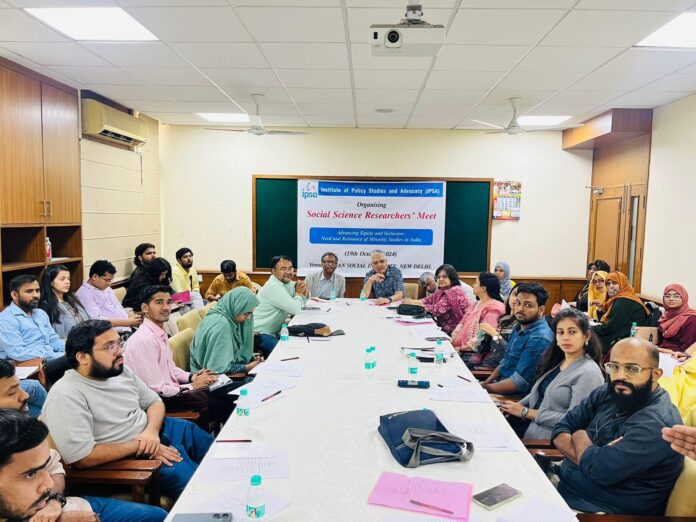NEW DELHI :

New Delhi :
On October 19, 2024, the Institute of Policy Studies and Advocacy (IPSA) hosted a one-day workshop at the Indian Social Institute, focusing on the prospects and challenges of conducting research on minorities in the context of social inclusion.
The event aimed to gather key stakeholders—academics, PhD scholars, students, policymakers, and civil society organizations—to discuss the importance of minority studies, particularly regarding the Muslim community in India, and to propose actionable recommendations for aligning research with national and state policies.
The workshop brought together over 40 research scholars and senior academics from various universities, including Jawaharlal Nehru University, Jamia Millia Islamia, and Delhi University. The Social Science Researchers’ meet, titled “Minority Studies in India,” sought to create a collaborative environment for scholars to share insights and identify areas needing further exploration.
Dr. Jawed Alam Khan, General Secretary of IPSA, initiated the discussions by outlining the workshop’s objectives and context. He emphasized IPSA’s ongoing initiatives in minority research and highlighted the necessity for continued dialogue in this field.
Dr. Furqan Qamar, a professor at Jamia Millia Islamia, underscored the critical role of institutions in development and articulated the significant challenges faced by Indian Muslims. He called for studies that investigate the underlying causes of Muslim marginalization, including their access to financial resources, and stressed the importance of producing accessible and critical literature.
Dr. Tanvir Aeijaz from Delhi University contributed to the discourse by examining the distinction between “minority” and “Muslim” in academic literature. He discussed the need for equity and affirmative action, particularly in the context of the Post-Sachar Report, and raised crucial questions about citizenship amid rising deprivation and exclusion practices.
The workshop also featured a panel discussion chaired by Dr. Asheref Illiyan, Professor and Head of the Department of Economics at Jamia Millia Islamia. Dr. Ghazala Jamil, an Assistant Professor at Jawaharlal Nehru University, urged the need for fresh perspectives in studying Muslims, advocating for a shift away from outdated stereotypes. She emphasized areas like land rights, urbanization, and the unique challenges faced by Muslim women.
Dr. Khalid Khan discussed the importance of empirical research on inclusion and development theories, while Dr. Zakaria Siddiqui called for a redefinition of minority status and highlighted the critical gaps in data concerning Muslim communities.
Following the panel, an Open House session allowed participants to share their research and discuss the future of minority studies. Scholars expressed the need for collaborative efforts, research groups, and support mechanisms to foster engagement among minority researchers. The session was addressed by Professor Arvinder Ansari and Dr. Ghazala Jamil, who responded to participants’ questions and concerns.
In conclusion, the workshop highlighted the urgent need for in-depth research on Muslim communities in India, advocating for a multidisciplinary approach to address issues of equity, representation, and social justice. Participants agreed on the importance of forming a dedicated agency for minority research, which could produce newsletters, journals, and foster a network of scholars committed to advancing minority studies in India.
source: http://www.indiatomorrow.net / India Tomorrow / Home> News> Society / by admin india tomorrow / October 25th, 2024








